Tamar Ghosh: Travels in India
Tamar Ghosh, RSTMH Chief Executive, has recently returned from India where she was able to connect with many friends of RSTMH in order to strengthen our work and influence in the country. She explains what she got up to.
Two weeks ago, I was able to take my first international flight for two years, to travel to India.
Like so many of us I have relied on virtual platforms for almost all aspects of my work. I was delighted to have a chance for face-to-face time with existing and new contacts and colleagues, to pick up conversations and activities that have had to be paused since 2020.
India is home to two of our current Trustees, our RSTMH India Country Ambassador, Editorial Board members, a newly appointed Student Ambassador, grant and scholarship recipients, and many members and Fellows. The trip provided an opportunity to meet many of those individuals and strengthen relationships with volunteers and friends, who do so much to ensure we can deliver our work.
It was also a great chance to raise awareness of some current activities including our Early Career Grant programme, travel scholarships and events being planned for later in the year, our journals, and new membership directory and members area.
Our current strategy has been focused on encouraging the support of many groups, including those early in their careers. Direct support for them includes discounted membership, providing Early Career (formerly called Small) Grants, travel scholarships, chances to receive mentoring and grow networks at our events, discounts to our events, and a student essay competition. We hope these provide new skills and experiences, as well as enhance CVs for future career opportunities. My time in India was also about being able to meet individuals who have benefited from grants and travel scholarships and to see how their careers had progressed, as well as seek advice on how else we could support them.
I wanted to understand what health challenges exist for India after the last two years of COVID-19, and what this may mean for our work. This year we will be consulting widely about our strategy for the next 5 years. As part of this, I was able to interview a number of individuals – including those known to RSTMH as well as those who are not, both in senior roles in tropical medicine and global health and also students and those starting their careers. It included those in clinical roles, in microbiology and in research.
Meeting our partners in India
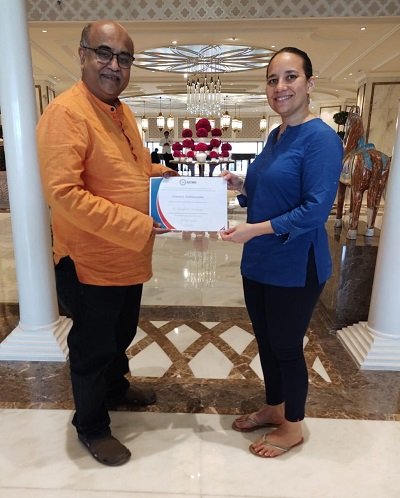
My journey started in Delhi with a meeting with Dr Shirshendu Mukherjee, RSTMH Country Ambassador for India. We talked about all aspects of his role in disseminating information about the Society as well as advising us on how we can do better work in India, and more of it. Since lockdown started, India, along with a few other countries, has been added to our list of low and middle-income (LMIC) countries, which are eligible for a discount to membership. Shirshendu and I talked about our membership across India, our current partner activities and planned events, and also how we can raise awareness of our 2022 Early Career Grant Programme which is currently open for applications. We also talked about the number of high-quality applications in past years which we are unable to fund due to lack of budget, and whether there are funding opportunities for Indian applicants which we could develop.
In Delhi I hosted a dinner for members and Fellows which included former winners of our Early Career Grants Programme and our Country Ambassador. Conversation was free-flowing and covered many areas of interest including how COVID-19 has affected other diseases, how the Society could improve its support of members and Fellows and how we could raise awareness of the Society in India. Dr Chandrakant Lahariya also donated to us two copies of his new book ‘Till We Win: India’s fight against the COVID-19 Pandemic’ which we will be able to offer as presents.
Finally, in Delhi I met with Dr Vinod Joshi, Professor at Sharda University, Ghaziabad who is Editorial Advisor and Associate Editor on our journal Transactions, along with two of his faculty colleagues, who have an active role in reviewing manuscripts for us. As well as talking about the journals, we spoke about our work across India and they provided some good advice about how to strengthen our networks.
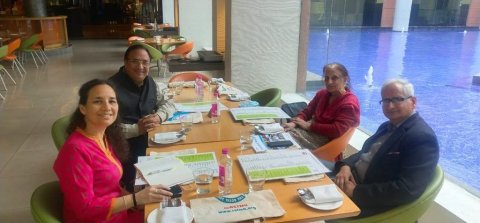
From Delhi I travelled to Chandigarh where I was able to meet a group of members and Fellows along with some senior members of the faculty from PGIMER. As in Delhi, I was interested to understand what cases of existing and emerging diseases Postgraduate Institute of Medical Education and Research (PGIMER), Chandigarh has seen throughout the last few years, the main challenges of the pandemic, and how health is now improving.
We talked about current topics such as AMR and diseases such as mucormycosis, TB, dengue and fungal infections and how they have been affected during COVID-19. I updated the group about our work to establish a new strategy over the next few months and heard their thoughts on what the Society could do better in India for institutions like theirs. Finally, we talked about planning a longer meeting at PGIMER later this year to raise awareness of the Society, in particular our grants, events and our journals.
Calcutta School of Tropical Medicine, Kolkata
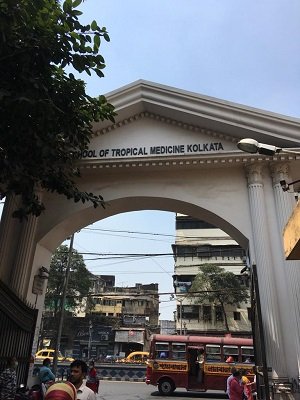
From Chandigarh I travelled to Kolkata, where I met with Professor S K Guha, Director, and Professor Bibhuti Saha, Head, Department of Infectious Diseases & Advanced Microbiology from the Calcutta School of Tropical Medicine, and were kindly accompanied by our Trustee Professor Pramod Samantaray.
Despite many visits and even some time living in Kolkata, this was my first time visiting the institution which was established in 1914. At this meeting I learned more about some of the diseases being seen regularly at the institution, their reflections of the last two years, as well as current opportunities for working together. Some of the diseases we discussed included fungal infections, leprosy, HIV, scrub typhus and drug resistance. We touched upon the merits of vertical and horizontal programming and national programmes such as AMR.
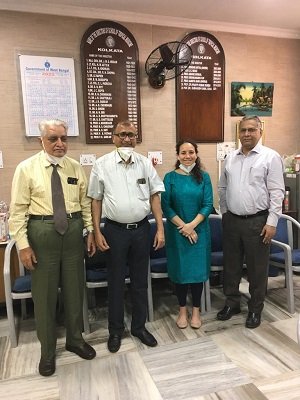
I was fortunate to be able to meet with a couple of our members, where we discussed ways to encourage engagement in the city and area. We talked about the need to strengthen the ability of our members to be able to network with one another and about our planned activities across India.
CMC Vellore
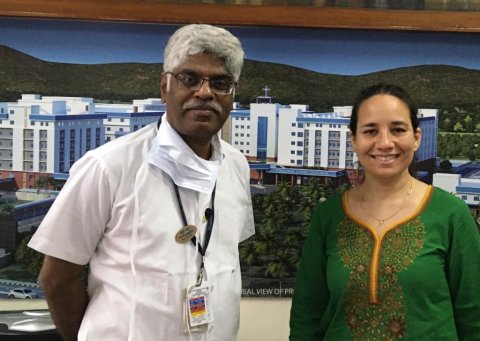
From Kolkata I travelled to Vellore to spend time at CMC Vellore hosted by Dr George M Varghese, Professor & Head, Department of Infectious Diseases, Christian Medical College Vellore and RSTMH Trustee. During my time there, I had the pleasure to meet a number of faculty including the current Director Dr J.V Peter, Dr Balaji Veeraraghavan and Dr Sitara Rao.
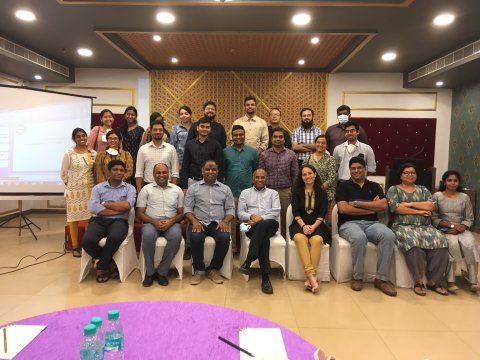
I was delighted to attend an event organised by Dr Varghese with a group of faculty and students from different disciplines to discuss the society. As part of this we heard presentations from Dr Abi Manesh (RSTMH Travel Scholarship awardee from 2017) Dr Karthik G (RSTMH Small Grant awardee 2019) and Dr Yamuna Devi B (RSTMH Small Grants awardee 2018) on how this support had helped their careers.
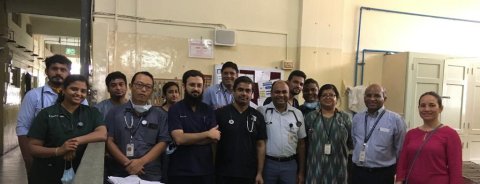
Here I also attended a ward round with the Infectious Disease team to learn about some of the current challenges being faced. We had a chance to discuss the growing specialism of Infectious Diseases across India and how RSTMH may be able to affect those early in their careers to access some knowledge and experience in this area. Rounding off my time at CMC Vellore I had a meeting, organised by Dr Varghese with a group of faculty, to talk specifically about our forthcoming strategy and how they felt RSTMH could improves its work in India and globally. These are conversations to be continued this year.
On the way back from Vellore I stopped in Chennai for a lunch with member and former RSTMH Travel Scholarship awardee from 2018, Dr Rubeshkumar. We talked about how the scholarship enabled him to attend the 2018 RSTMH Annual Meeting, what he got from that experience and time, and why he has continued to stay connected to RSTMH. We also talked about how he feels RSTMH needs to improve its work for those starting their careers, and shared his advice for the society, and its work with those starting their careers in tropical medicine. It was great to hear that he remains in contact with two other travel scholarship awardees from his year, based in the UK and Kenya.
There were many other individuals and institutions within India which I was unable to visit on this trip due to it being quite last minute with quarantine rules changing. I hope to be able to pick these conversations up when I next visit India, hopefully later in 2022.
It is clear that there is much work for us to do across India, including conducting some webinars to raise awareness of our grants, and events to encourage those early in careers to develop their ideas into research questions. We need to reschedule the Research in Progress events we had to pause in 2020, and also consider the opportunity for us to enable the strengthening of skills, experience and networks, across the country and region.
While in India, I had many discussions on interesting inputs to the next strategy, which can be built upon through our forthcoming survey and interviews.
I was reminded during my trip of how much our volunteers do to support us and our work and of the need to ensure we recognise this contribution, formally and informally.
It would be wonderful to welcome more members to RSTMH from India, and I hope that we are able to provide the value which will encourage them to join and be engaged with our work in the coming months and years.

